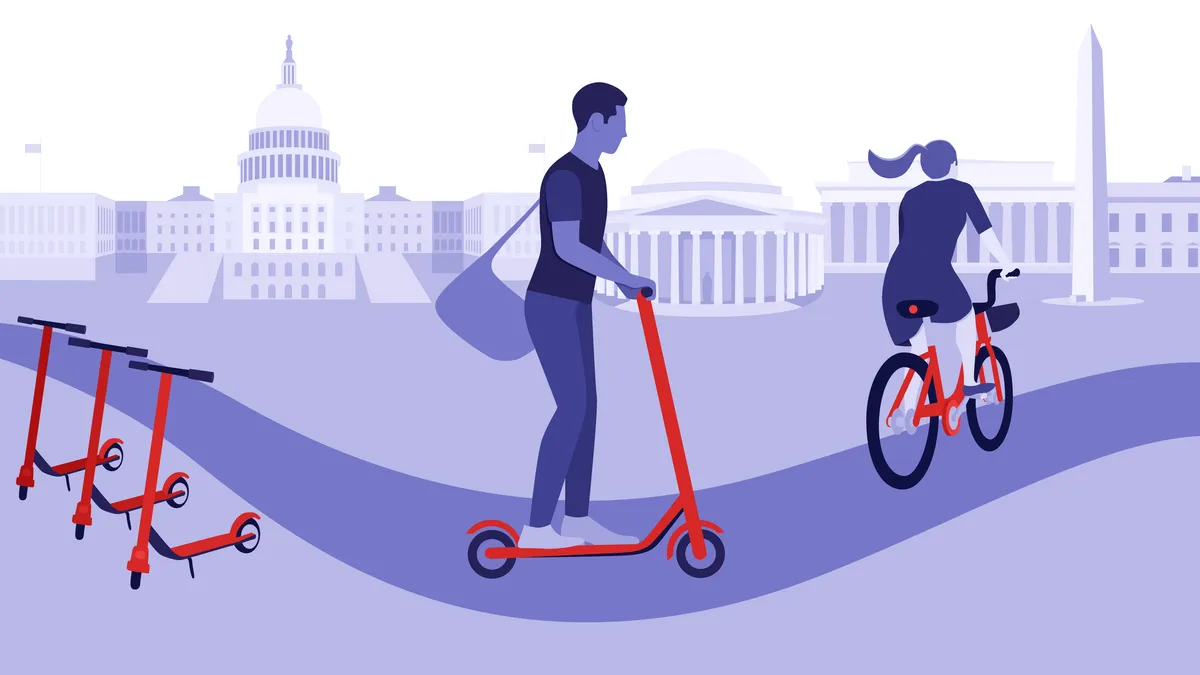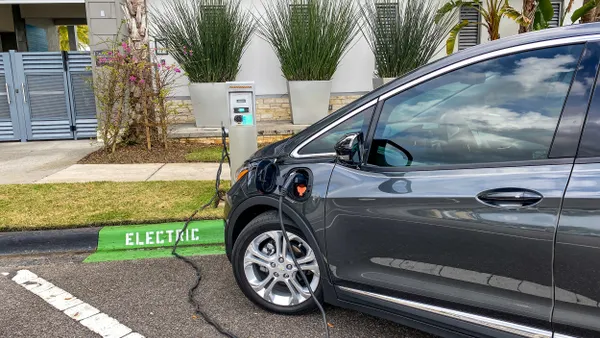UPDATED, Feb. 28, 2020: Lime, Bird, Bolt and Razor are set to leave the District on April 1 after losing their appeals to continue operating in the city. Until then, the operators will need to continue following the 2019 guidelines regarding fleet sizes.
Scooters from Lyft, Skip, Spin and Uber-owned Jump will remain in the city under 2020 Terms and Conditions; each operator is permitted up to 2,500 vehicles. Electric bikes from Jump and HelBiz are also included in the 2020 program. The total number of e-bikes permitted in public space is 2,020, according to DDOT.
Dive Brief:
-
The District Department of Transportation (DDOT) has approved Lyft, Skip, Spin and Uber-owned Jump to remain in Washington, DC and operate a combined total of 10,000 scooters, almost double the current number of scooters permitted (5,235), as part of its 2020 dockless vehicle sharing program. Bolt, Bird, Lime, and Razor scooters, which currently operate in DC, will no longer be permitted in the city.
-
DDOT also approved Jump and newcomer HelBiz to operate 5,000 e-bikes in 2020, and will add 100 "off-sidewalk parking corrals" for dockless vehicles across the city's eight wards.
-
DDOT received 19 applications for its 2020 dockless vehicle program. Thirteen applications were for e-scooters; one application was for traditional bikes; and five were for e-bikes. Four applications were disqualified for devices that didn’t meet the proper "definition of personal mobility devices or bicycles."
Dive Insight:
The chosen operators likely came as a surprise to some users. Bird and Lime, which will not be allowed to remain in the city, are largely considered major players in the space with each company boasting millions of rides on their vehicles.
Meanwhile Lyft and Skip, which will remain in DC, have also experienced some recent setbacks. Lyft announced in November that it would remove scooters from six markets, while Skip failed to secure a permit this year to operate in San Francisco, resulting in the closure of its San Francisco maintenance facility and 34 employee layoffs. That company also pulled its scooters from DC and San Francisco this summer due to a vehicle catching fire.
The decrease to the number of DC's scooter operators could reinforce or point to a larger consolidation trend in the industry. Bird acquired its competitor Scoot earlier this year, and mobility company OjO Electric recently announced plans to acquire competitor Gotcha Mobility.
DDOT will require that the selected operators comply with the Mobility Data Specification (MDS) tool created by local governments to help manage data gathering from private mobility providers in the "public right of way."
As part of its dockless vehicle sharing program, DDOT also released its proposed terms and conditions, including responses to public comment. Comments included concerns about rider safety on roadway and dockless vehicles blocking walkways from people with disabilities. Favorable comments included support for the additional mobility options in regards to equity and easing commutes.
"Dockless vehicles are part of our effort to meet Mayor Bowser's goal to create reliable, accessible transportation options for Washingtonians across all eight wards," DDOT director Jeff Marootian said in a statement. "The District's 2020 dockless vehicle sharing program is rooted in thoughtful expansion, program evaluation and feedback from stakeholders."
Looking to the future, DDOT also said it will seek additional "alternative transportation options" and is considering a pilot to test "non-traditional" shared dockless vehicles.












